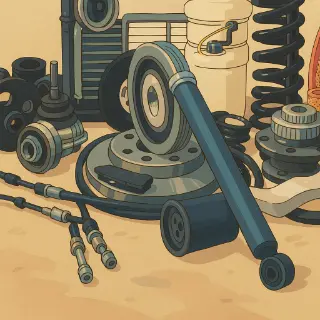By PartsVibe
Building Lasting Relationships with Chinese Auto Parts Manufacturers
Explores the cultural nuances of developing successful partnerships with Chinese suppliers, offering practical strategies for communication, relationship building, and long-term business collaboration.

Introduction
The most successful auto parts importers understand that sourcing from China is not merely a transactional process but a relationship-building endeavor. Establishing strong, long-term partnerships with Chinese manufacturers yields benefits far beyond initial cost savings: preferential treatment, higher quality consistency, better communication, and priority during supply constraints. This guide explores strategies for cultivating productive relationships with Chinese auto parts suppliers.
Understanding Cultural Context in Chinese Business
The Importance of "Guanxi"
The Chinese concept of "guanxi" (关系) - loosely translated as "relationships" or "connections" - is fundamental to business success in China:
- Built on mutual trust and reciprocity
- Developed through personal interaction
- Maintained through consistent communication
- Strengthened by face-to-face meetings
- Enhanced by demonstrating long-term commitment
Communication Styles
Recognizing differences in communication approaches:
- Indirect communication may be preferred over direct confrontation
- Context matters as much as explicit statements
- Saving "face" (maintaining dignity and reputation) is essential
- Patience during negotiations is viewed positively
- Written follow-up to verbal agreements is important
Establishing Initial Relationships
1. Research and Preparation
Before initial contact:
- Understand the supplier's history and capabilities
- Research their existing clients and markets
- Prepare specific questions about manufacturing processes
- Develop clear specifications for your requirements
- Learn basic Chinese greetings and business etiquette
2. Face-to-Face Meetings
Despite digital communication options, in-person visits remain invaluable:
- Factory tours provide insight into actual capabilities
- Meals and social activities build personal connections
- Direct observation of quality control processes
- Opportunity to meet multiple team members
- Demonstration of serious commitment
3. Clear Communication of Expectations
Establish mutual understanding through:
- Detailed product specifications
- Quality requirements and acceptable tolerances
- Realistic timeline expectations
- Testing and certification requirements
- Communication protocols and primary contacts
Nurturing Ongoing Relationships
1. Consistent Communication
Maintain regular contact:
- Scheduled video conferences (consider time zones)
- WeChat for quick updates and questions
- Periodic in-person visits (2-4 times annually if possible)
- Updates on market conditions and feedback
- Sharing of long-term business plans
2. Relationship Investment
Beyond transactions:
- Remember important Chinese holidays with appropriate greetings
- Small, thoughtful gifts that represent your country or region
- Invitations to visit your facilities when they travel internationally
- Introduction to potential new business opportunities
- Sharing of industry knowledge and market insights
3. Balanced Negotiation Approach
Focus on mutual benefit:
- Avoid excessive pressure on pricing alone
- Recognize and reward quality improvements
- Develop reasonable MOQ arrangements
- Consider longer-term contracts for price stability
- Establish fair payment terms that work for both parties
Addressing Challenges Constructively
1. Quality Issues
When problems arise:
- Present evidence clearly and factually
- Propose solutions rather than just highlighting problems
- Avoid public criticism or confrontation
- Give "face" by allowing opportunity to correct issues
- Document agreements on resolution process
2. Communication Barriers
Overcoming language and cultural differences:
- Use visual aids and samples when possible
- Confirm understanding with specific questions
- Provide written follow-up to verbal discussions
- Consider a bilingual team member or representative
- Learn key technical terms in Chinese
3. Intellectual Property Protection
Balancing openness with protection:
- Compartmentalize sensitive information
- Use appropriate legal protections
- Build trust before sharing proprietary knowledge
- Clearly define confidentiality expectations
- Monitor market for unauthorized reproduction
Developing Strategic Partnerships
1. Collaborative Development
Moving beyond buyer-seller relationship:
- Joint product development initiatives
- Shared market research and feedback
- Collaborative problem-solving
- Mutual investment in process improvements
- Exchange visits for technical teams
2. Exclusivity Arrangements
When appropriate:
- Territory-specific exclusivity agreements
- Dedicated production capacity
- Custom tooling arrangements
- Special packaging or branding
- Preferential pricing structures
3. Long-term Planning
Creating mutual vision:
- Three to five-year roadmaps
- Graduated volume commitments
- Technology development timelines
- Market expansion strategies
- Contingency planning for industry changes
How PartsVibe Facilitates Relationship Building
PartsVibe bridges the gap between international buyers and Chinese manufacturers by:
- Cultural Navigation: Our bilingual team understands both Western business expectations and Chinese cultural nuances
- Relationship Facilitation: We arrange and participate in key meetings, ensuring productive communication
- Conflict Resolution: When issues arise, we provide mediation and practical solutions
- Ongoing Representation: Continuous presence in China maintains relationships between your visits
- Strategic Guidance: Advice on relationship development based on extensive experience
Conclusion
Building strong relationships with Chinese auto parts manufacturers requires investment of time and cultural understanding, but yields substantial returns in quality, reliability, and preferential treatment. By approaching these relationships with respect, patience, and a long-term perspective, auto parts wholesalers and distributors can develop a significant competitive advantage in their supply chain.
Need help building productive relationships with Chinese auto parts manufacturers? Visit PartsVibe.com to learn how our team can facilitate successful partnerships.